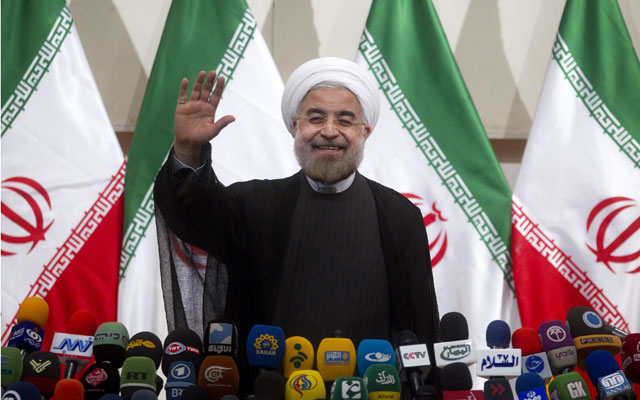Rouhani’s U.N. Speech: Softer Rhetoric, but Iran Remains Defiant
James Phillips /
President Hassan Rouhani of Iran snubbed the Obama Administration’s efforts to stage a symbolic meeting and delivered an underwhelming speech before the United Nations General Assembly on Tuesday.
Although he brought a change of tone, there was little change in substance: Iran continues to refuse to comply with U.N. Security Council resolutions requiring it to halt its uranium enrichment program and other activities necessary for building a nuclear weapon.
Rouhani promised that “we can arrive at a framework to manage out differences” but then ruled out giving up Iran’s “right” to enrich uranium, the diplomatic fig leaf that Tehran has long used to reject any pressure to rein in its nuclear weapons program. He warned against the “shortsighted interests of war-mongering pressure groups” in the United States and denounced sanctions as being “violent, pure and simple.”
Before leaving for New York, Rouhani pledged to use his trip to present the “true face of Iran” in an effort to gain relief from U.N. sanctions imposed because of Iran’s nuclear defiance. Known for his “smile diplomacy,” Rouhani clearly presented a more attractive face than his predecessor, Mahmoud Ahmadinejad, whose offensive speeches provoked boycotts and walkouts by numerous U.N. delegations in the past.
But Iran’s new president did not budge an inch from the defiant nuclear policy of his predecessor. That should not be surprising, because Iran’s nuclear policies are set by the Supreme Leader, Ayatollah Ali Khamenei, who calls the shots on all important issues in Iran.
Rouhani’s role is to present a gentler face to the outside world as part of a sophisticated charm offensive aimed at deflating international pressure over Iran’s nuclear weapons program. Rouhani has issued soothing words via Twitter to outside audiences while presiding over a theocratic dictatorship that denies Twitter and other social media to the Iranian people for fear it will help them mobilize against the regime.
But all the high-tech propaganda efforts and soft words do not hide the fact that Rouhani remains determined to continue Iran’s nuclear weapons program. No surprise there. When he served as Iran’s chief nuclear negotiator in talks with Western countries from 2003 to 2005, he has boasted that his diplomatic efforts bought valuable time for Iran to continue its nuclear efforts.
During that time, Iran agreed to abide by enhanced safeguards administered by the International Atomic Energy Agency but failed to follow through and fully cooperate. Now, Rouhani is again promising cooperation—but only if sanctions are dropped.
Given Tehran’s long record of duplicity on the nuclear issue, it is crucial that sanctions are maintained until Tehran takes concrete and irreversible steps to reduce the threat of a nuclear breakout. Washington should not agree to reduce sanctions pressure until Tehran has agreed to halt its uranium enrichment activities, transferred its stockpile of enriched uranium out of the country, allowed more intrusive inspections, and shut down its enrichment facility at Fordow.
This is the message that should be conveyed to Iranian Foreign Minister Javad Zarif when he meets with Secretary of State John Kerry and foreign ministers from Britain, China, France, Germany, and Russia today to discuss Iran’s nuclear program.
Rouhani may allow Iran to present a new face to the world, but he has long served as an important mainstay of a hostile regime that has repeatedly failed to deliver on its promises to comply with its non-proliferation obligations.
Rouhani needs to take significant actions, not merely make more promises, if he wants to ease Iran’s international isolation and sanctions-related economic problems.

